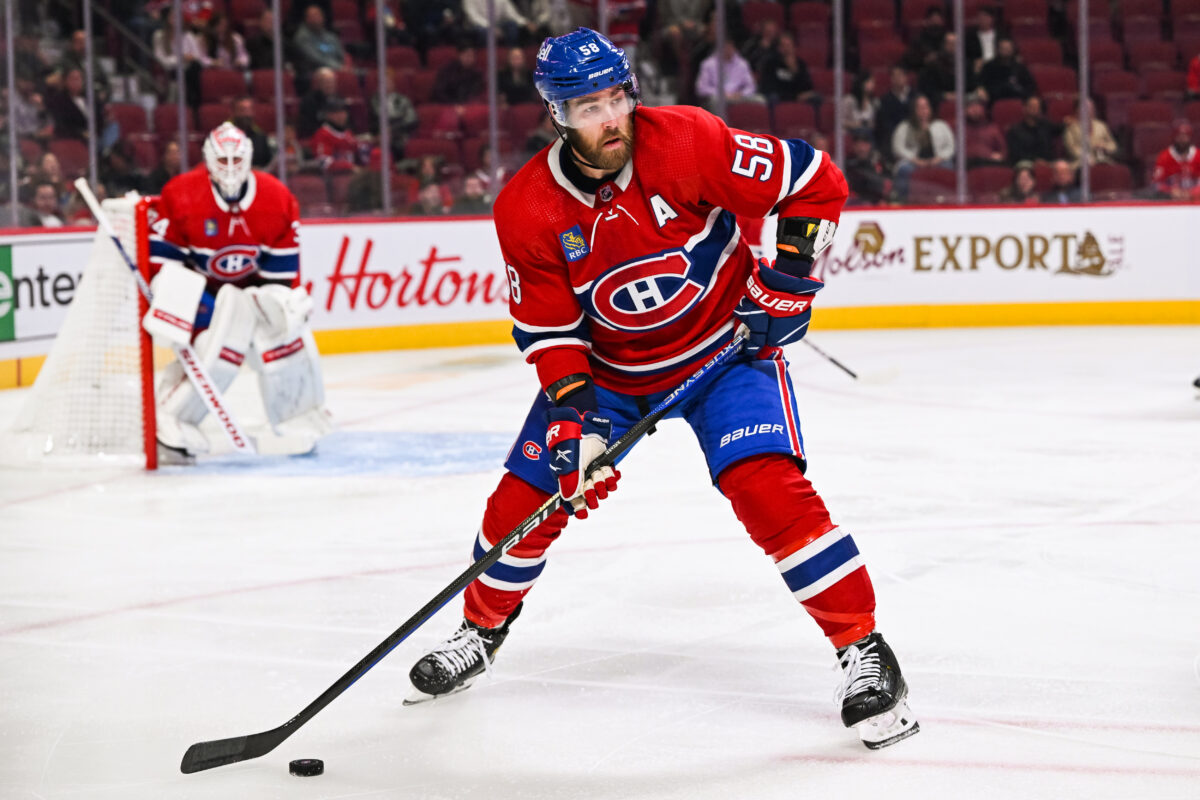RDS displayed an interesting stat during the Montreal Canadiens’ (latest) embarrassing loss to the Ottawa Senators on Jan. 23. During a power play, RDS showed that Mike Matheson co-leads all defensemen across the league in goals scored on the man advantage with five. The Habs’ power play then proceeded to fail to score on that specific power play and in, coincidentally, five total opportunities during the game. This is a recurring problem. So, naturally people are thinking he’s one of the ones who’s got to go by the trade deadline? Huh?

Obviously, Matheson would hold value on the trade market as the March 8 deadline approaches. It’s likely every contending team would love to be able to fit a defenseman capable of scoring 10-plus goals and 50-plus points in a season under their respective salary caps. And Matheson’s cost-effective $4.875 million hit (up until 2026) makes it possible. That doesn’t mean the Canadiens should pull the trigger, though… far from it.
Canadiens Can Still Use Matheson
Really, any team can use Matheson, but emphasis on the “any.” It includes the Canadiens, whose 20th-ranked power play (18.7%) is only as “strong” as it is because of Matheson. So, trading him away is counter-intuitive to be polite. Really dumb to be not as much.
Granted, there’s some justification behind the notion Matheson’s going to be 30 and how the Canadiens can stand to maximize his value by acquiring future assets for the sake of the ongoing rebuild. However, look at it from the opposite angle, in that, whatever future assets the Habs would gain, they would have to luck out in a serious way for any one of them to turn into an offensively capable defenseman like Matheson. Lightning rarely strikes twice by turning a late-first-round pick like him (23rd in 2012) into a star for all intents and purporses, and, seeing as you’d presumably be trading him to a contending team, late picks are what you’re going to get.
Sure, the Canadiens have Lane Hutson, who was drafted at No. 62 in 2022, on the way. The hope is he’ll develop into even more of an offensively capable left-handed defenseman, maybe even more of a complete left-handed defenseman, than Matheson. However, if everyone can get off the hype train for just a minute, they’d realize that, as great as Hutson has been, no one (no one!) knows for certain how well his out-of-NHL success will translate in the league itself.

In the here and now, the Canadiens have someone proven in Matheson. They have someone who has established himself as being in elite company in team history from a production perspective. They have an alternate captain from the area, who wants to be here, to be part of the future, presumably even help develop the future in the form of Hutson, based on their similar skillsets. You don’t or at least you shouldn’t trade someone like that away unless there’s a risk of losing them for nothing, via free agency for example.
Seeing as Matheson will only be turning 30 (and will only be 32 when his deal ends), it’s a reasonable assumption his production will stay fairly high for the next few seasons, at which point they can then capitalize at the 2026 trade deadline, if they so choose. Realistically, they’re not going to be losing all that much value coming back, based on how much buyers tend to overpay at the deadline, even for expiring contracts.
Canadiens Set to Sell at Trade Deadline, but Not Just Anyone
Obviously, it’s becoming increasingly clear the Canadiens are sellers this upcoming trade deadline. So, players like Sean Monahan and Tanner Pearson, who are each on expiring contracts, are probably on their way out of town, regardless of what you can get for them.
You can even argue the Canadiens should entertain offers for other veterans on non-expiring deals like Joel Armia and Jake Allen. There’s just no room on the roster for either of them past this season. In Allen’s case specifically, considering the net is the one place they haven’t suffered injuries, there isn’t even room right now, with the three-goalie system they’re rolling out sputtering in terms of its effectiveness enabling any of their netminders to find a groove. However, that’s just it, in that you need to take it case by case.
Related: Canadiens Face Tough Decision as Primeau Becomes Waiver-Eligible
Otherwise, where do you stop, because, at 27, fellow-goalie Samuel Montembeault is hardly a spring chicken and hardly a long-term solution in net, but, without him, you don’t have a No. 1, at least not during the team’s projected transitional period into contenders. Meanwhile, someone like right-handed defenseman David Savard seems like an ideal candidate to be moved, despite his contract having one year left. He’s past his best-before date at 33, plays a stay-at-home style that runs counter to general manager Kent Hughes’ initial vision for the team and was a player he had no say in acquiring, having inherited his deal. In practice though, not so fast.

The Canadiens just aren’t as deep on Savard’s right side on defense. Sure, prospects David Reinbacher and Logan Mailloux are potentially on their way eventually, but not right now. On top of being the team’s only purely defensive presence on the back end, Savard serves as an insurance policy for the time being… even a placeholder for someone like Justin Barron, who was just demoted to the American Hockey League.
Barron as a Canadiens Case Study
Barron actually makes for an interesting case study for this piece’s purposes. The Canadiens got him back for Artturi Lehkonen from the Colorado Avalanche a few seasons ago at the trade deadline as an up-and-coming prospect and he hasn’t exactly panned out as expected. You can argue the Habs should have kept Barron up at this point, in spite of his shortcomings in his zone, because, if you can’t make mistakes now as a young player, when overall expectations for the team are low, when can you?

If you’re Matheson, you can seemingly make them all the time, because in terms of style he and Barron are very similar and very similarly prone to defensive mistakes. The difference is, Matheson is more refined in terms of his offensive capabilities, which makes up for his miscues. Matheson also has veteran experience. More to the point, Matheson is also a veteran, who’s no longer exempt from waivers. So, there may be a double standard in play, but, from an asset-management perspective, the strategy is sound.
So, you can look past the perception the Canadiens are displaying zero tolerance in Barron’s case in a bid to make the playoffs. They’re not. While heading into the season, the goal may have been to try to make them or at least progress significantly in the standings, it’s still all about patience. The team’s recent efforts have been frustrating to say the least, but it’s nothing fans in general didn’t sign up for in the context of an extended rebuild.
However, for a rebuild to be effective, you need a solid foundation. A player like Matheson can contribute in that way (as well as offensively, which he’s doing with relative aplomb). Trading away veterans indiscriminately just because they hold value now isn’t sound in comparison. There’s an undeniable temptation to strike when the iron is hot instead of taking the risk it cools down, like with Josh Anderson, who will also be 30.
While the ship may have sailed on trading Anderson (or at least getting good value for him), the Canadiens still can Matheson, but they shouldn’t. Again, take it case by case, because Anderson’s peak as a middle-six forward with the capacity to chip in, in the top six on occasion, has been clearly defined for a while now. It’s at least been visible to all those who chose to see it. In contrast, Matheson continues to surprise to the upside, to the point waiting and seeing makes the most sense. On an offensively challenged team starved for skill and creativity, it’s the only option that does, because, if you’re frustrated now, imagine how frustrated you’d be without him.
